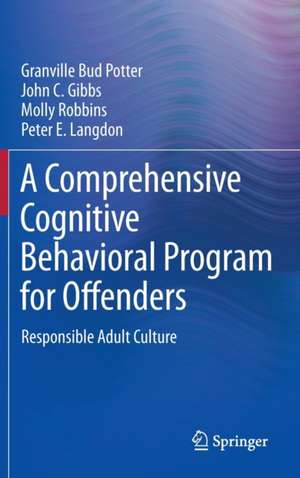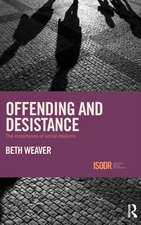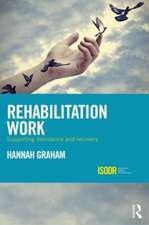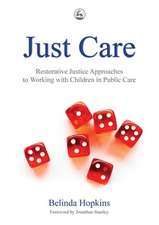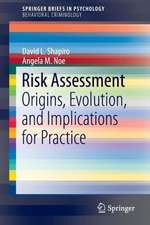A Comprehensive Cognitive Behavioral Program for Offenders: Responsible Adult Culture
Autor Granville Bud Potter, John C. Gibbs, Molly Robbins, Peter E. Langdonen Limba Engleză Hardback – 26 iun 2015
| Toate formatele și edițiile | Preț | Express |
|---|---|---|
| Paperback (1) | 388.34 lei 6-8 săpt. | |
| Springer International Publishing – 9 oct 2016 | 388.34 lei 6-8 săpt. | |
| Hardback (1) | 395.63 lei 6-8 săpt. | |
| Springer International Publishing – 26 iun 2015 | 395.63 lei 6-8 săpt. |
Preț: 395.63 lei
Nou
Puncte Express: 593
Preț estimativ în valută:
75.71€ • 82.21$ • 63.60£
75.71€ • 82.21$ • 63.60£
Carte tipărită la comandă
Livrare economică 22 aprilie-06 mai
Preluare comenzi: 021 569.72.76
Specificații
ISBN-13: 9783319175355
ISBN-10: 3319175351
Pagini: 200
Ilustrații: XVII, 279 p. 6 illus., 2 illus. in color.
Dimensiuni: 155 x 235 x 22 mm
Greutate: 0.59 kg
Ediția:2015
Editura: Springer International Publishing
Colecția Springer
Locul publicării:Cham, Switzerland
ISBN-10: 3319175351
Pagini: 200
Ilustrații: XVII, 279 p. 6 illus., 2 illus. in color.
Dimensiuni: 155 x 235 x 22 mm
Greutate: 0.59 kg
Ediția:2015
Editura: Springer International Publishing
Colecția Springer
Locul publicării:Cham, Switzerland
Public țintă
Professional/practitionerCuprins
Part I. Introduction.- Chapter 1. Introduction. Welcome to Responsible Adult Culture.- Part II. Preparation and Implementation.- Chapter 2. Getting Started.- Part III. Motivating Offenders to Help One Another Think and Act Responsibly.- Chapter 3. Cultivating a Responsible Adult Culture through Mutual Help Meeting.- Part IV. Equipping Offenders to Help One Another Think and Act Responsibly.- Chapter 4. Equipping a Responsible Adult Culture through Equipment Meetings.- Chapter 5. Equipping with Skills to Manage Anger and Correct Thinking Errors.- Chapter 6. Equipping with Social Interaction Skills.- Chapter 7. Equipping with Mature Moral Judgment (Social Decision Making).- Chapter 8. Final Equipment Meeting: Up or Down?.- Appendices.
Recenzii
“One of the most impressive of the moral development interventions that I have encountered . . . A moral education miracle. I believe that this book represents the best approach to corrections available. The authors genuinely care for and respect adult offenders. . . . They appeal to the staff’s intelligence and good will without indulging in the jargon that one finds in many “therapeutic” books and manuals.'' — F. Clark Power, Professor, University of Notre Dame
Notă biografică
Granville Bud Potter (M.Ed., Bowling Green State University, 1975) has extensive administrator and practitioner experience in corrections and is a co-author of The EQUIP Program (and first author of The EQUIP Implementation Guide). For 12 years, he was Executive Director of the Franklin County (Ohio) Community-Based Correction Facility. While serving in this capacity, he successfully adapted the EQUIP program into Responsible Adult Culture. His previous positions were at the Ohio Department of Youth Services within the institution and parole divisions. He is also self-employed as a consultant to correctional and educational agencies, having worked with agencies in 30 of the United States, as well as in Canada, Australia and Europe. He is a past president of the Ohio Correctional and Court Services Association. Much of his professional experience has involved the use of a peer-group modality.
John C. Gibbs (Ph.D., Harvard University, 1972) is Professor of Developmental Psychology at The Ohio State University. He has been a member of the State of Ohio Governor’s Council on Juvenile Justice and is a faculty associate of The Ohio State University Criminal Justice Research Center. His work has concerned developmental theory, assessment of social cognition and moral judgment development, and interventions with conduct-disordered individuals. His authored or co-authored books include, in addition to The EQUIP Program, Moral Development and Reality: Beyond the Theories of Kohlberg, Hoffman, and Haidt and Moral Maturity: Measuring the Development of Sociomoral Reflection.
Molly Robbins (M.C.J., Criminal Justice Administration, Tiffin University, 2002) is Executive Director at the Franklin County (Ohio) Community Based Correctional Facility. As such, she is responsible for the facility, its staff, and the Responsible Adult Culture Program (including training, supervision, implementation,and quality assurance). She has done international consulting work and has trained throughout Ohio on the EQUIP Program and the Responsible Adult Culture Program. She is a member of the American Correctional Association and the National Association of Blacks in Criminal Justice (NABCJ). In 2009, NABCJ presented her with the Mary Church Terrell Award, presented annually for activism and positive change in the field of criminal justice at the city and state level. She has worked in corrections for over 15 years with the Ohio Department of Rehabilitation and Correction, Columbus State Community College and the Franklin County Community Based Correctional Facility.
Peter E. Langdon, (D.Clin.Psy, 2000, Institute of Psychiatry, King’s College, London; Ph.D., 2010, Tizard Centre, University of Kent) is Senior Lecturer in Clinical Psychology and Disability, as well as Honorary Consultant Clinical & Forensic Psychologist, Tizard Centre, University of Kent. He is a past and present Research Fellow of the National Institute for Health Research in the United Kingdom. He has worked with offenders with dual diagnosis for over ten years and has a joint clinical academic appointment with the National Health Service (NHS) and the University of Kent. His clinical work takes place at the Broadland Clinic, a medium-secure NHS forensic mental health care service for offenders with dual diagnosis. His research interests fall broadly within the area of developmental psychology and include the adaptation and evaluation of psychological therapies for people with intellectual and developmental disabilities.
He is also working on several clinical trials of psychological therapies for people with developmental disabilities who have mental health problems.
John C. Gibbs (Ph.D., Harvard University, 1972) is Professor of Developmental Psychology at The Ohio State University. He has been a member of the State of Ohio Governor’s Council on Juvenile Justice and is a faculty associate of The Ohio State University Criminal Justice Research Center. His work has concerned developmental theory, assessment of social cognition and moral judgment development, and interventions with conduct-disordered individuals. His authored or co-authored books include, in addition to The EQUIP Program, Moral Development and Reality: Beyond the Theories of Kohlberg, Hoffman, and Haidt and Moral Maturity: Measuring the Development of Sociomoral Reflection.
Molly Robbins (M.C.J., Criminal Justice Administration, Tiffin University, 2002) is Executive Director at the Franklin County (Ohio) Community Based Correctional Facility. As such, she is responsible for the facility, its staff, and the Responsible Adult Culture Program (including training, supervision, implementation,and quality assurance). She has done international consulting work and has trained throughout Ohio on the EQUIP Program and the Responsible Adult Culture Program. She is a member of the American Correctional Association and the National Association of Blacks in Criminal Justice (NABCJ). In 2009, NABCJ presented her with the Mary Church Terrell Award, presented annually for activism and positive change in the field of criminal justice at the city and state level. She has worked in corrections for over 15 years with the Ohio Department of Rehabilitation and Correction, Columbus State Community College and the Franklin County Community Based Correctional Facility.
Peter E. Langdon, (D.Clin.Psy, 2000, Institute of Psychiatry, King’s College, London; Ph.D., 2010, Tizard Centre, University of Kent) is Senior Lecturer in Clinical Psychology and Disability, as well as Honorary Consultant Clinical & Forensic Psychologist, Tizard Centre, University of Kent. He is a past and present Research Fellow of the National Institute for Health Research in the United Kingdom. He has worked with offenders with dual diagnosis for over ten years and has a joint clinical academic appointment with the National Health Service (NHS) and the University of Kent. His clinical work takes place at the Broadland Clinic, a medium-secure NHS forensic mental health care service for offenders with dual diagnosis. His research interests fall broadly within the area of developmental psychology and include the adaptation and evaluation of psychological therapies for people with intellectual and developmental disabilities.
He is also working on several clinical trials of psychological therapies for people with developmental disabilities who have mental health problems.
Textul de pe ultima copertă
This book presents Responsible Adult Culture (RAC), a truly comprehensive program for helping offenders to think and act responsibly. It provides the tools of the program with great clarity. In addition to exploring the needs of all offenders, the book addresses the special needs of both female and dual-diagnosis offenders. Responsible thinking means habitually seeing others and situations accurately, rather than in self-serving and egocentrically distorted ways. Because self-centered thinking is typically reinforced by negative group norms, RAC starts with the cultivation of a constructive climate (“mutual help” groups) to motivate change. Motivated group members then gain tools for responsible thinking through “equipment” (cognitive behavioral) meetings. These tools pertain to social skills, anger management, and the correction of self-centered thinking through social perspective taking (cognitive restructuring). Beyond documented reductions in distorted thinking and recidivism rates, RAC’s synergy or round-the-clock interpenetration of positive groups and tools promotes a safer and more humane institutional culture.
Caracteristici
Presents a great program in a clear, informal, and implementation-friendly style Shows a synergy of major approaches Promotes cultivation of a constructive climate to motivate change and responsible thinking
